The 2024 Mid-Career Scientist of the Year was awarded to 2 joint winners. The category recognises outstanding scientists who have completed their highest degree between 5-15 years ago, and has demonstrated excellence in a field of science, scientific research or technology advancement.
In the 23rd year of the Premier's Science Awards we celebrate the work of Professor Morten Erik Allentoft and Associate Professor Gianina Ravencroft as our Mid-Career Scientist of the Year winners.
Professor Morten Erik Allentoft
Evolutionary biologist Professor Morten Allentoft has transformed our understanding of human prehistory. In more than 20 papers published in two of the world’s most prestigious scientific journals, Nature and Science, he has used ancient DNA to document how the continents were colonized by early humans, and how present-day populations were formed.
As head of the Curtin University Trace and Environmental DNA Laboratory, Professor Allentoft is now shifting focus from humans themselves towards human impacts. Using environmental DNA and genomic analyses he is making solid contributions to improve conservation and monitoring of Western Australia’s unique biodiversity. A key research program in his lab, eDNA for Global Environmental Studies, is supported by BHP’s Social Investment Framework.
Associate Professor Gianina Ravencroft
Harry Perkins Institute of Medical Research and The University of Western Australia
Associate Professor Gianina Ravenscroft FFSc RCPA is a pioneering leader at the Harry Perkins Institute of Medical Research and The University of Western Australia. Her work primarily addresses the genetic underpinnings of rare diseases, focusing on neuromuscular disorders.
Associate Professor Ravenscroft’s dedication has led to significant discoveries, including identifying novel disease genes, which have direct clinical implications. Her research is not just academically commendable; it has tangible benefits, offering diagnostic insights and paving the way for genetic therapies. This offers hope to families grappling with these conditions, illuminating paths to potentially life-altering interventions.




